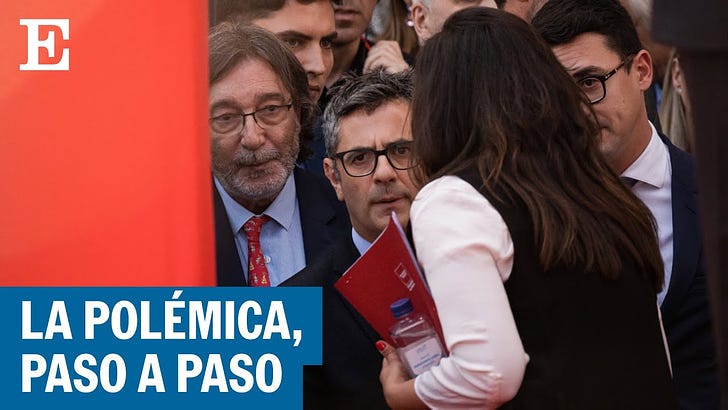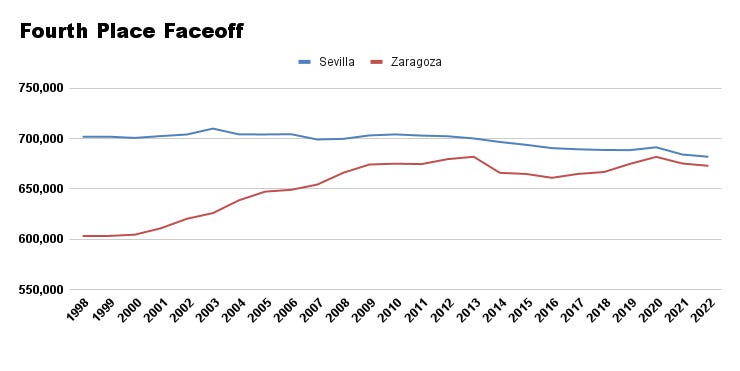By @IanMount and @AdrianBono | May 4, 2023 | Madrid | Issue #12
🎉 Welcome to The Tapa, an English-language, weekly newsletter about all things Spain!
🥜 This Week in a Nutshell: With Monday and Tuesday being public holidays in Madrid, we were hoping for a boring week. Alas, once again we were proven wrong as politicians never rest and will not let a good scandal go to waste. So grab a glass of wine (it’s only Thursday morning after all) and read on. It’s worth it, we promise.
Oh, and to all the Star Wars fans out there, May the fourth be with you.
🕺If you haven’t subscribed yet, please do so by clicking on the button below.
🫶 And if you already have, please send this newsletter around to your friends and family and help us keep growing.
A very public scandal
🤼♀️ Felix Bolaños Clashes with Ayuso’s Team During Dos de Mayo Celebrations
An argument in plain sight between Minister of the Presidency Félix Bolaños and Isabel Díaz Ayuso’s team during the official Dos de Mayo military-civic parade in Madrid has been dominating the headlines since Tuesday. Who was right? Who was wrong? Who overreacted? And more importantly, who cares?
It was supposed to the typical, run-of-the-mill government event to commemorate the anniversary of the Second of May uprising. A few soldiers would march on the Puerta del Sol, right in front of the Royal House of the Post Office, with Madrid regional President Isabel Díaz Ayuso, Mayor José Luis Martínez Almeida, Defense Minister Margarita Robles and PP leader Alberto Nuñez Feijóo in attendance, among others.
But we’re 24 days away from the municipal and regional elections and every single political event has the potential to scandalize. This is exactly what happened on Tuesday, as we all witnessed live a new clash between representatives from the Madrid and national governments that took the existing tension to new heights.
As the government officials mentioned above began walking on stage to watch the parade, Bolaños (who was attending the event despite not being invited) tried to go on stage too, but was stopped short by the Madrid region’s chief protocol O
officer, Alejandra Blázquez, who told him that “institutional representation” had already been arranged (in reference to minister Robles, who was already on stage representing the national government) so he couldn’t go up there.
The whole exchange was caught on video and is explained in detail by El País in the video above. “We have an organization that is perfectly stablished,” Blázquez could be seen telling Bolaños, and explained that they were in compliance with “all rules related to institutional representation.” Despite arguing that he had the right to be on stage, he was denied access and the parade went on without him.
The seven people on stage were Chief of the Defense Staff of the Spanish Armed Forces Teodoro López Calderón, Madrid Assembly President Eugenia Carballedo, Defense Minister Margarita Robles, Madrid regional President Isabel Díaz Ayuso, PP leader Núñez Feijóo, Madrid Mayor José Luis Martínez-Almeida and regional Vice President Enrique Ossorio. But no Bolaños, who ended up watching from the side.
So what the hell happened? And why? Well, it depends on who you ask.
The drama started on Sunday, when it became known that Bolaños would be attending the parade. The Díaz Ayuso administration had decided not to invite Prime Minister Pedro Sánchez this year (they don’t like each other, you see) and asked Minister of Territorial Policy Isabel Rodríguez to join them instead (since, according to the Madrid government she is in charge of affairs related to the autonomous communities). However, Rodríguez declined to attend, and the Executive confirmed that government delegate to Madrid Francisco Martín, Defense minister Robles and Presidency minister Bolaños would all attend.
But then representatives of the Madrid community said that, going by protocol, only Robles would be representing the national government and that Bolaños’ “self-invite would be a provocation”. While he was eventually saved a first row seat for the event’s medal ceremony, that didn’t stop him from trying to go on stage, which has now created a full-blown dispute a little over three weeks away from the elections. And both sides are happy to capitalize on it.
Isabel Díaz Ayuso spoke on the radio and said that Bolaños “came to provoke” and “ruin the event”.
“We’re normalizing the presence of a minister only because the (national) government tells us so,” she said, adding that autonomous communities are a “necessary counterweight” to the national government.
“Usually, there aren’t any ministers in official ceremonies of autonomous governments because it’s a day that belongs to them. What if the 22 ministers decide to attend?” she added, suggesting the problem was a lack of room on stage.
She also referred to those who were saying this was an electoral issue. “Do I need this? Am I in a position to need any of this? I don’t think so,” she said, hinting at her high polling numbers.
The national government, for its part, is arguing that Bolaños should have been allowed on stage and is citing a Royal Decree that regulates who has precedence in official government ceremonies in Madrid—and says ministers of the national government are ranked higher than, say, the mayor of Madrid.
National government officials claim that the Madrid government failed to comply with the decree and that the move is typical of an “anti-system” party that is seeking to delegitimize the Sánchez administration. “When you’re attacking a legitimate government, you’re attacking democracy”, said Moncloa spokesperson Isabel Rodríguez.
While the Madrid government used the lack of room on stage as the reason for the refusal, El País explains that the decree indeed gives preference to ministers (plural) over government officials like Almeida, Feijóo or Carballedo.
In the meantime, as polls suggest that Ayuso could win an absolute majority this May 28, center-right media like El Mundo is saying that Bolaños’ “mistake” could boost her chances.
PP sources who spoke to the newspaper said that “lots of people like it when someone stops the government on their feet… they are always imposing their agenda”.
Ultimately, both parties think the kerfuffle is a win, the kind of teapot tempest that helps to bring out the base.
🔔 A Message From Our Sponsor
Bucólico Café is a project of connection that was born as a specialty coffee shop.
We value time and understand that it represents both a cycle and an instant—chronology and nostalgia. Bucólico is a space that connects one’s soul with the purity, lightness and beauty of the countryside—while being in the city. Via a cup of coffee, a piece of cake or a song…
Located on Calle de Barbieri 4 — a few blocks from Plaza Chueca — Bucólico reassures the soul with a feeling of home.
Follow Bucólico Café on Instagram.
💬 Five things to discuss at dinner parties this week:
1.👑 The King’s speech
Former King and royal elephant shooter Juan Carlos I didn’t say much of anything during his recent sailing trip to Galicia, probably to avoid annoying his son (and actual King) Felipe VI as much as he did during a visit the previous year, when he sort of acted like a sitting monarch. Since leaving Galicia, though, he’s spoken, and as often happens when he speaks, scandal was there to cheer him on.
Not long after he left, El Confidencial published an excerpt from a book—King Corp. El imperio nunca contado de Juan Carlos I—that claimed that JC I had a love child named Alejandra with a fellow aristocrat.
Many people found this rather plausible, all things considered (“all things” including his long and tabloid-tastic relationship with Corinna zu Sayn-Wittgenstein/Larsen). As one Spanish told us while writing a Financial Times piece on the ex-King’s decline and fall several years ago, “He fell for two reasons: women and money…The women are a weakness of the Bourbons.”
Somewhat surprisingly, instead of ignoring the accusation, the King actually spoke out. "I absolutely deny having had any amorous relationship with Mrs. Rosario Palacios and consequently having a daughter with her," he told the Efe news agency from Abu Dhabi, where he now lives. He added that "out of respect for the truth and the honor" of the people implicated, he was obligated to deny the claims by "rejecting and condemning as false all that has been published in relation to this invented affair".
And not only did the ex-King speak out—his supposed love child did too. Alejandra de Rojas, the daughter JC I supposedly had with the (now deceased) countess Rosario “Charo” Palacios (who married one of the founders of the Falange), gave her own statement to Efe a few days later. And she is not pleased. At all.
“I am forced to categorically deny my status as the 'secret daughter' of King Juan Carlos, as well as all the comments made about an alleged special treatment received during my childhood or youth, due to that false condition,” she said. And there was more.
The “completely unfounded claims” had caused “almost irreparable damage” to her family, she added, and she reserved the right to take legal actions against the authors and those who propagate the claims.
We for one are really looking froward to a lawsuit, if only for tall the dirt that could fly. But we suspect that it won’t get that far. Sigh. For now, at least we have a photo of Charo with Sofia Loren.
2.⌚Might be best to leave the Rolex at home
The UAE’s ambassador to Spain probably didn’t expect a lunchtime family stroll in Salamanca would turn violent—but it certainly did. On Sunday, April 30, at 2:30 p.m., in the midst of the long Worker’s Day weekend, Omar Obaid Al Shamsi was walking on c/Don Ramón de la Cruz with his wife and daughter when a motorcycle carrying two people stopped next to them.
The one who’d been riding behind the driver (the paquete, or package) pointed a pistol at the ambassador and family and threatened them. The ambassador’s wife was wearing jewelry and a Rolex.
The ambassador tried to intervene and protect his family but was pistol-whipped by the gunman, who grabbed the Rolex (worth €25,000) and quickly made off on the bike.
The Emirates embassy filed a police report about the robbery later that afternoon.
While the location and victim of the robbery were really eye-catching, the robbery itself was, well, not. Motorcycle-riding rob-and-dash thieves—known in our former home of Argentina as motochorros—have become kind of a thing in Spain.
This band of thieves—known as La banda del Rolex for sort of obvious reasons—reportedly committed other crimes around Madrid on Friday and Saturday, and back in February four motochorros were arrested for robbing luxury watches in wealthy Barcelona barrios. The robberies were often violent, and the police picture of the staples the medical services put in the head of one victim (above) is pretty gruesome.
Spanish national team footballer Dani Olmo had his €30,000 Rolex robbed on the street in Valencia last June.
And last May the police arrested eight more robbers in Madrid—including a member of the Neapolitan mafia. As they appear to be out of prison, these are thought to be the culprits from last weekend.
3.💃El ‘sorpasso’ aragonés
Everybody talks about India passing China in population, but nearer and dearer to our Spanish hearts, we may be seeing an Iberian ‘sorpasso’. Preliminary population statistics for Spain’s municipalities—based on the number of empadronados as of Jan. 1, 2023—show that Zaragoza has passed Sevilla to be the country’s fourth biggest city.
The numbers—694,109 for Aragon’s capital vs. 693,229 for Andalucía’s—are close (a difference of only 880) and still need to be verified, but point to a long-standing trend. As it has grown as a logistics hub, Zaragoza’s population has risen steadily, while Sevilla’s has stagnated and even slid. In 2003, Zaragoza had about 626,000, while Sevilla had some 710,000.
Both cities grew after a pandemic dip, which allows the numbers to serve everyone. In Sevilla, socialist mayor Antonio Muñoz called the last year’s jump of 2,202 the best in the decade, and attributed it to his government’s policy of job-creation and public housing. His opponent in the upcoming May municipal elections, the PP’s José Luis Sanz, blamed the city’s population slide since 2015 (when the socialists won the mayoralty) on “urban paralysis and the decline in the quality of life in the neighborhoods” that’s pushed people to the suburbs.
Spain’s INE statistics bureau will release final figures later this year, and it’s very possible Sevilla will keep its title—for now. An eventual ‘sorpasso’ seems all but inevitable (but don’t worry Sevillanos—you get to keep the Feria even if you lose your crown). At least the top three don’t need to worry. Madrid (3.3m), Barcelona (1.6m) and Valencia (790,000) have a good cushion.
4.🧑⚖️ A PM candidate and 50 prosecutors walk into a bar
PP party boss Alberto Núñez Feijóo had a dinner with 50 state prosecutors who are affiliated with a conservative judicial association some two weeks ago, and they proceeded to tear apart the government of socialist PM Pedro Sánchez. We know this because El País managed to recreate the 90-minute conversation, revealing the political and partisan views of many high-level prosecutors—and one recent Constitutional Court Magistrate. Faijóo said the meeting was “correct and institutional” (read: nothing to see here) while the Sánchez government went into conniptions.
Feijóo told attendees that his government would quickly repeal en bloc a whole lot of the laws the Sánchez gov passed via emergency decree. The crimes of sedition and illegal referendum—loathed by Catalan separatists, among others—would return. He questioned the Ley Trans. And he thanked the prosecutors for “reestablishing the constitutional order”—a reference to the trial of the Catalan politicians behind the illegal 1O referendum on independence from Spain. The crowd appeared to really like it. Of course, these were things he’d said before...
What some of the prosecutors said, well, that was a stronger drink. Spoken without the veneer of impartiality they wear in court, their words was reminiscent of the sometimes leaked speeches to like-minded groups given by U.S: Supreme Court justices.
Antonio Narváez, a Constitutional Court magistrate until several months ago, said he hoped Feijóo would win the election and become Prime Minister. He also mentioned doubts about elections run by Indra (an almost Trump-like election fraud worry), and warned the PSOE socialists were preparing a Basque Country coalition government with the “terrorist sympathizers” of Bildu.
Consuelo Madrigal, who served as attorney general in the PP gov of Mariano Rajoy, slammed Sánchez’s government for “perverting” the legislative process by sneaking in last-minute amendments that changed the purported focus of laws, like those added by ERC to lower the jail sentences of Catalan indy leaders (which in the end did not work as planned). “This perversion of the legislative procedure is linked to a perversion of the institution that we have experienced in recent years,” she said. “How can it be reversed?”
The Sánchez government and its coalition allies went ballistic (briefly, of course; this is politics after all and time moves quickly from scandal to scandal).
Chief of staff Felix Bolaños called the meeting a “very grave act” and Sánchez said, “We have an opposition that maneuvers in the dark, with hidden interests, with the sole objective of walking back laws and rights.” Several ministers also spoke, as if from the same script, of “secret meetings” to plan to “overturn laws.”
Podemos took the volume up a notch, as it does. Ione Belarra, party secretary general, linked Feijoo's meeting with prosecutors to the PP’s "kidnapping of the Judiciary": “They are going to repeal everything if they govern, they are going to reverse all the advances of this Government, everything that has cost us so much to build. And this savage right wing can only be stopped with more rights, promoting structural changes, with courageous policies.”
After reading Madrigal’s comments, another judicial association—a left-leaning one—called on her to resign immediately for making “partisan statements.” The conservative group that held the dinner then called the dust-up a “smoke screen” and said it had been having political guest speakers at their events since 2017.
Yes, lots of smoke; no, not much fire. That conservative prosecutors like a conservative politician doesn’t shock, and being caught there might have been good for Feijóo—makes him look like he’s in with the law. And, for the left, making much of the “secrecy” and scaring voters with the repeal of laws is good politics too. (We are less than four weeks from municipal elections, after all.) So everybody wins again!
5. 🇨🇴 Vox abandons Congress floor as Colombia’s Petro is about to speak
Colombian president Gustavo Petro was in town yesterday as part of his first official visit to Spain—and far-right party Vox wasn’t very happy about it. So when Petro, who was invited to address Congress, was about to take the stage, the hard-right caucus led by Santiago Abascal decided to leave the floor as a sign of protest, which prompted the remaining deputies from other parties to give the South American head of state a long standing ovation.
The leftist Petro is no stranger to controversy, and has repeatedly used his Twitter account to promote the so-called Spanish “black legend”, which describes the discovery of America as the “conquest of an enslaving regime” and the eventual independence movements throughout the region as “a liberation from “Spanish oppression”. However, when speaking before Congress yesterday, he abandoned his confrontational tone and presented a more conciliatory speech.
Congress Speaker Meritxell Batet made opening remarks on the floor, saying she hoped his attempts at “total peace among Colombians” were successful, then proceeded to let him take the lectern. However, as he was preparing to speak, Vox deputies (Santiago Abascal included) abandoned the floor en-masse.
Abascal called Petro a “terrorist” (for his participation in the M-19 urban guerrilla movement when he was younger) and a man who “insults Spain to later be decorated with the medal of the order of Isabella the Catholic. This is yet another display of this government’s foreign policy… always submissive to the enemies of freedom.”
A few days ago, Vox had warned that warned they would not take part in the event for considering the Colombian leader “an obstacle to liberty and the development of human rights” in other Ibero-American countries.
In fact, Abascal had organized to meet with anti-Petro protesters who had gathered outside Congress at noon.
In his congressional address, Petro asked Spain and the EU to come up with “concrete and urgent measures” before the next summit of Latin American countries in order to “avoid the planet’s extinction.”
“We have a mission today,” he said: “Saving humanity”. He spoke out against those who attack him in his own country for “trying to promote change” and against climate change deniers in general.
Petro met with the King and Queen of Spain earlier on Wednesday, before his speech in Congress. They offered an official welcome ceremony in his honor at the Royal Palace, which included Prime Minister Sánchez and other government representatives. In the afternoon, the King and Queen of Spain held a dinner in his honor at the Royal Palace.
🙏 Before you go, please remember to share this newsletter with your friends on social media. The more we grow, the more information we’ll be able to offer each week.
We’ll be back next week with more.








